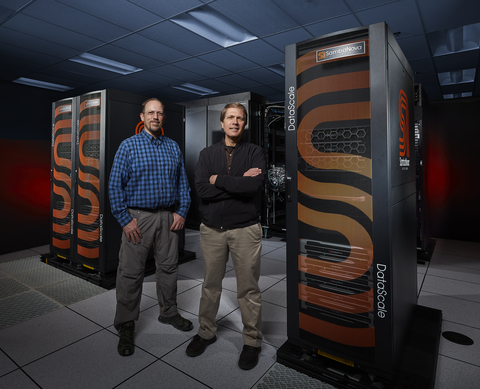Financial News
SambaNova and Lawrence Livermore National Laboratory Scale Up Collaboration to Accelerate AI for Science
SambaNova DataScale® deployed to accelerate the performance of global supercomputers
ISC23 — SambaNova Systems, the company that was first to market with domain-specific, pre-trained foundation models to underpin generative AI, and Lawrence Livermore National Laboratory (LLNL), today announce that they’re scaling up their collaboration to bring SambaNova spatial data flow accelerator into LLNL’s Computing Center. This solution upgrades LLNL’s cognitive simulation program by improving the speed and accuracy of scientific research.
This press release features multimedia. View the full release here: https://www.businesswire.com/news/home/20230522005287/en/

Brian Van Essen, computer scientist at LLNL and Informatics Group Lead and Bronis R. de Supinski, CTO for Livermore Computing (LC). photo credit: Gary McLeod, LLNL
LLNL is a leading federal research institution that leverages high performance computing (HPC) across its research. Increasingly, the institution has studied how deep neural network hardware architectures can accelerate traditional physics-based simulations as part of the National Nuclear Security Administration’s (NNSA’s) Advanced Simulation and Computing program.
Computer modeling and experimentation are essential to scientific research. Models simulate natural phenomena and experiments, which provide data to understand underlying principles. However, they face two fundamental challenges. First, even the most complex models do not achieve sufficient fidelity to simulate reality. Second, modern experiments regularly generate overwhelming amounts of data. To address these issues, LLNL researchers are working on cognitive simulation (CogSim), leveraging the SambaNova systems to improve the fidelity of models as well as to manage the growing volumes of data.
"Multi-physics simulation is complex,” said Brian Van Essen, computer scientist at LLNL and Informatics Group Lead. “Our inertial confinement fusion (ICF) experiments generate huge volumes of data. Yet, connecting the underlying physics to the experimental data is an extremely difficult scientific challenge. AI techniques hold the key to teaching existing models to better mirror experimental models and to create an improved feedback loop between the experiments and models. The SambaNova system helps us create these cognitive simulations.”
LLNL has been working with SambaNova since 2020. The collaboration started as a proof-of-concept and evolved to creating prototypes of the final solution together. The first stage of the collaboration involved tight integration of SambaNova DataScale hardware input directly into the Corona supercomputing cluster. This integration first enabled the use of AI calculations to improve overall speed, performance, and productivity. More importantly, it created a heterogeneous system architecture that integrates SambaNova’s system into the existing supercomputing cluster to support efficient CogSim. The next stage allows the heterogeneous system to be less tightly integrated with the supercomputing clusters. This design supports a wider selection of workloads, allowing LLNL to use a wider range of traditional resources, a more generalized solution that expands the possible use-cases.
“We are looking to leverage AI to improve speed, energy use, and data motion,” said Bronis R. de Supinski, CTO for Livermore Computing (LC), which operates LLNL’s Computing Center. “SambaNova has a different architecture than CPU or GPU-based systems, which we are leveraging to create an enhanced approach for CogSim that leverages a heterogeneous system combining the SambaNova DataScale with our supercomputing clusters.”
“Scientific discoveries rely on speed, accuracy, and collaboration. We’ve built an incredible partnership to solve complex scientific issues - together,” said Rodrigo Liang, CEO of SambaNova Systems. “We’re excited to leverage SambaNova’s agility, power, and flexibility to fulfill Lawrence Livermore National Laboratory’s mission of science in the national interest.”
By leveraging SambaNova’s architecture, LLNL’s need to address critical use-cases in the scientific community demonstrates the opportunity and need to have a full stack AI solution. For more information, please visit sambanova.ai.
About LLNL
Founded in 1952, Lawrence Livermore National Laboratory provides solutions to our nation’s most important national security challenges through innovative science, engineering and technology. Lawrence Livermore National Laboratory is managed by Lawrence Livermore National Security, LLC for the U.S. Department of Energy’s National Nuclear Security Administration.
About SambaNova Systems
Customers turn to SambaNova to quickly deploy state-of-the-art generative AI capabilities within the enterprise. Our purpose-built enterprise-scale AI platform is the technology backbone for the next generation of AI computing.
Headquartered in Palo Alto, California, SambaNova Systems was founded in 2017 by industry luminaries, and hardware and software design experts from Sun/Oracle and Stanford University. Investors include SoftBank Vision Fund 2, funds and accounts managed by BlackRock, Intel Capital, GV, Walden International, Temasek, GIC, Redline Capital, Atlantic Bridge Ventures, Celesta, and several others. Visit us at sambanova.ai or contact us at info@sambanova.ai. Follow SambaNova Systems on Linkedin.
View source version on businesswire.com: https://www.businesswire.com/news/home/20230522005287/en/
Contacts
Virginia Jamieson
virginia.jamieson@sambanova.ai
+1-650-279-8619

Quotes delayed at least 20 minutes.
By accessing this page, you agree to the following
Privacy Policy and Terms and Conditions.



